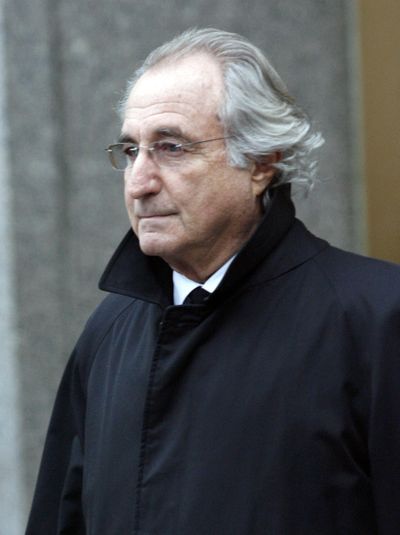Madoff could pay fine under ruling
Partial judgment in civil case must be approved by judge

WASHINGTON – The Securities and Exchange Commission on Monday announced an agreement with disgraced money manager Bernard Madoff that could eventually force him to pay a civil fine and return money raised from investors.
The partial judgment, which renders permanent a preliminary injunction that froze Madoff’s assets after his arrest in December, must be approved by the judge overseeing the case in federal court in Manhattan.
The civil proceeding is separate from the criminal case against the prominent Wall Street figure, who is accused of bilking $50 billion from investors in what may be the largest Ponzi scheme in history. Madoff was arrested on Dec. 11 after allegedly confessing to his sons that he had stolen from investors for years.
Federal prosecutors have asked a judge to revoke the bail of Madoff, who has been confined to his Manhattan penthouse under house arrest. Madoff, who has not been indicted, is widely expected to eventually enter into a criminal deal with prosecutors in which he would plead guilty in exchange for some form of leniency.
The SEC said Madoff agreed to the partial judgment without admitting or denying the allegations in its civil complaint filed on Dec. 11. However, the agreement says Madoff cannot contest the “facts” of the complaint for the purposes of determining his obligation to pay civil fines and restitution – which will be specified later.
The SEC says the basic facts of the complaint are that Madoff committed a $50 billion fraud and told his sons his investment business was a sham. Madoff told them he had “absolutely nothing,” that “it’s all just one big lie,” and was “basically, a giant Ponzi scheme,” according to the complaint.
Madoff’s defense attorney, Ira Sorkin, said only that his client’s agreement with the SEC “is a civil matter … (that has) nothing to do with the criminal matter at all.” He declined further comment.
The fallout from the Madoff affair has been widespread and has rocked a Wall Street already churning from the financial crisis. Thousands of victims who lost money investing with Madoff have been identified – including ordinary people and Hollywood celebrities – as well as big hedge funds, international banks and charities in the U.S., Europe and Asia. A 162-page list of thousands of clients made public last week counts scores of famous names – Hall of Fame pitcher Sandy Koufax, World Trade Center developer Larry Silverstein, actor John Malkovich and CNN host Larry King, to name a few – yet also multitudes of ordinary people.
The scandal also has brought disgrace to the SEC, which repeatedly ignored credible allegations about Madoff’s operations brought to it over the course of a decade. Congress and the agency’s inspector general are investigating what caused the regulatory failure over Madoff and why SEC inspections of his business failed to detect the improprieties.
The departure of Linda Thomsen, the SEC’s enforcement director since mid-2005, was announced by the agency on Monday, less than a week after she received an angry dressing-down before Congress over the Madoff breakdown. The new SEC chairman, Mary Schapiro, on Friday outlined new actions intended to strengthen and streamline the agency’s enforcement efforts.